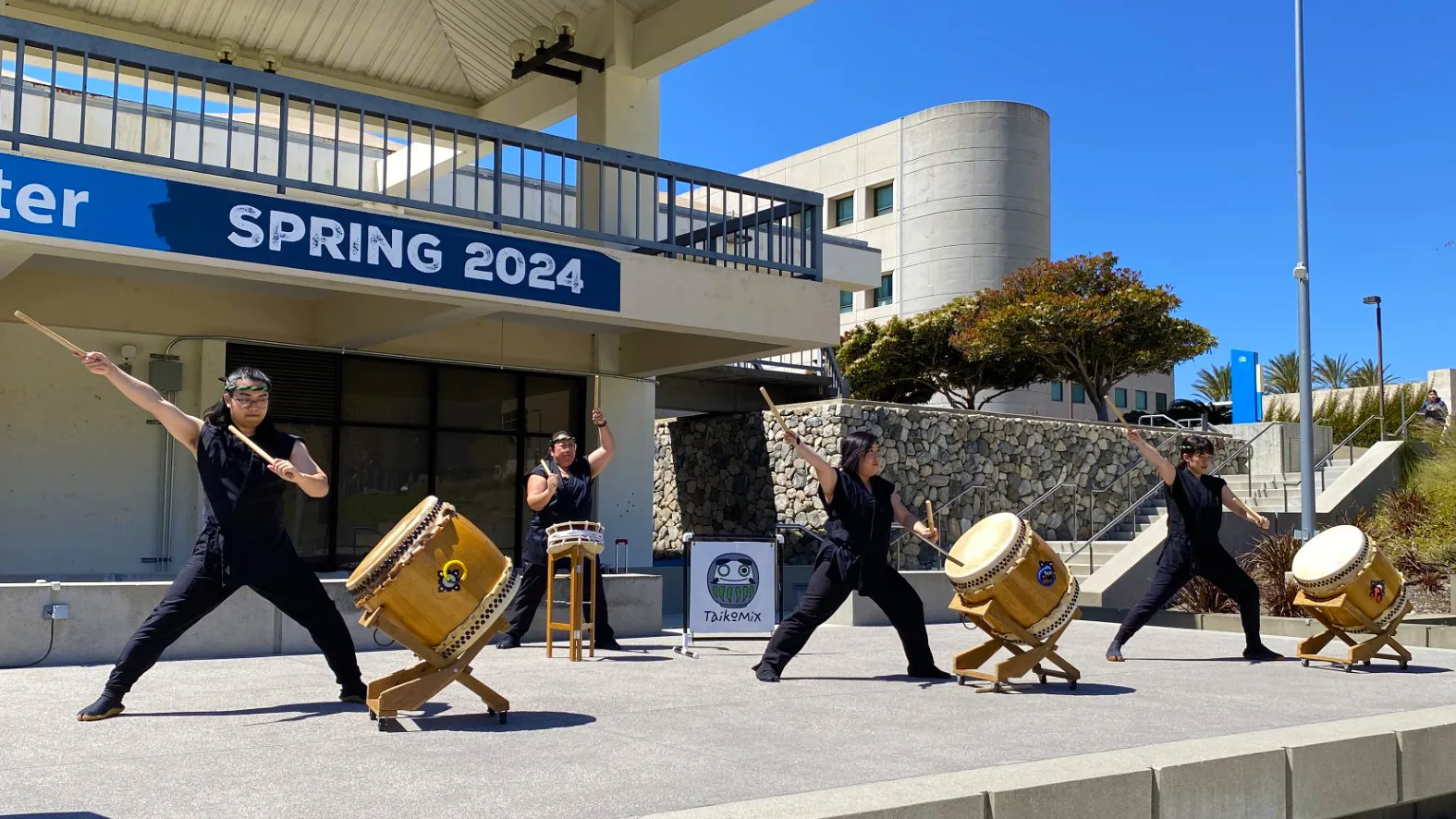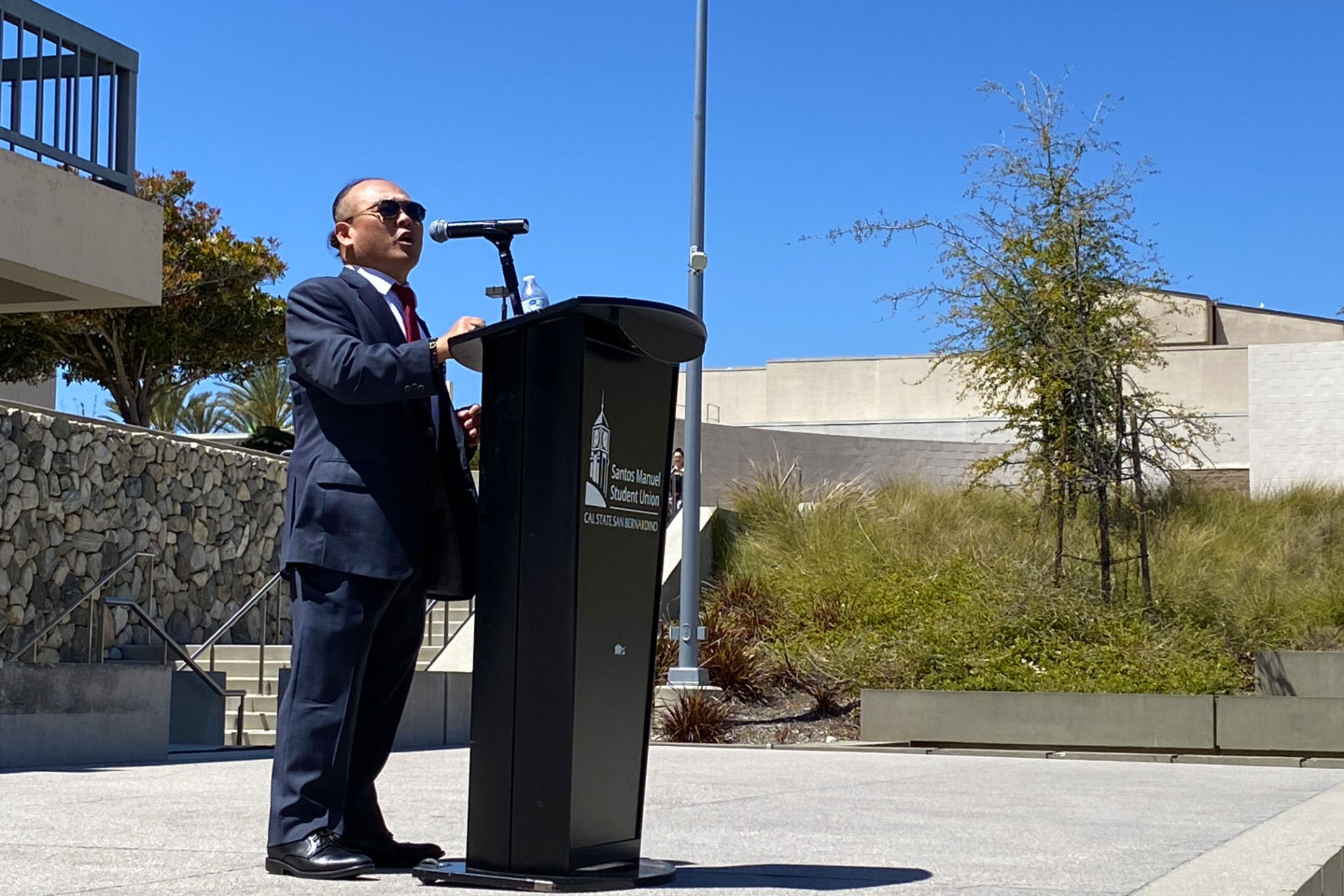Alan Llavore | Office of Strategic Communication | (909) 537-5007 | allavore@csusb.edu

John Kim says he’s seen many changes over the years, “some good, some bad.” While the good is to be celebrated, he issued a call to action to overcome the bad.
Kim, a lawyer with Asian Americans Advancing Justice Southern California, a legal aid group based in Los Angeles, was the keynote speaker at the opening event on April 10 of Cal State San Bernardino’s celebration of Asian Pacific Islander Desi American (APIDA) Heritage Month.
During his address, peppered with pop culture references and self-deprecating humor among more serious points, Kim presented his perspective on the theme of the university’s APIDA celebration: “Uplifting Identities: Sharing Our History,” sharing a little bit of his identity and history, and how it fits in the bigger tapestry of life as an American.
Most Asian American families count generations of immigrants this way: those who came to the U.S. as adults are first generation, those born here are second generation, their children constitute the third generation, and so on. Kim identified himself as “1.5 generation, meaning I came here when I was 15” from South Korea with his family. He grew up in the L.A. suburb of Rowland Heights, earned a psychology degree from UC Riverside and a law degree from Loyola Law School.
“I'm a lawyer, manager, husband, a foodie, baseball fan, but not a Dodgers fan. They shouldn't get to buy a championship, right?” he joked, referring to the team’s off-season signing of big-name players. “Musician, poet, joker, smoker, midnight toker (a reference to the Steve Miller Band’s ‘The Joker’), you know what I'm talking about.
“We are many things,” he said. “We may come from different backgrounds, but we are Americans, right? We enrich this country, this melting pot, with our unique background and history.”
On the positive side, “we see more diversity, we see more acceptance of differences.”
Yet, Kim said, the more things change, the more they stay the same.
“Historically, Asian Americans had to deal with laws and actions by other people: the Chinese Exclusion Act, Japanese American internment camps, a permanent foreigner treatment, right? How many of you get compliments for speaking English well, even though you're born here, or you've been living here for generations? Recently, I’ve seen this trend where if you have Chinese surname, they start accusing people of being Communists spies. I thought it would be better, but it's getting worse.”

Adding fuel to that is the sentiment expressed by a former president, who referred to COVID-19 as “kungflu” and continues to denigrate immigrants, Kim said.
“Let me ask you this: how much do you think an Asian American man’s life is worth?” he said. “According to a judge in Detroit, 40 years ago, it's $3,000. Forty years ago, Vincent Chin was murdered by unemployed auto workers, beaten up with a baseball bat.” The two men, a father and his stepson, blamed Japan for the downturn and layoffs in the U.S. auto industry, and, thinking Chin, a Chinese American, was Japanese and responsible for their own unemployment. They attacked Chin on the night he celebrated his bachelor party. The two got three years’ probation and fined $3,000 each.
“Probation means there's no jail time for murdering an Asian American,” Kim said.
And 40 years later, Asian Americans still face discrimination and hate crimes. A common phrase hurled at them is “go back to where you came from.” As part of his work with Asian Americans Advancing Justice Southern California, he and his colleagues work to educate community members on how to report hate crimes to authorities. The problem they’ve run into is that when those community members are targets of racial and hate slurs, many of them don’t react because they’ve become desensitized to the point that such incidents are treated as daily occurrences, Kim said.
He offered an action plan to overcome such sentiments.
“First, take charge,” he said. “We need young leaders like you.” He urged them to seek the best and reliable resources, such as his organization, to organize and start grass-roots movements.
“No. 2, be Mr. Wolf,” Kim said, a pop culture reference to the movie, “Pulp Fiction,” and one of its characters, Winston “The Wolf” Wolfe, who was always called upon to solve problems and clean up the messes of others. “I want you to be that Mr. Wolf. A long time ago, my law professor mentioned, ‘Be that person, when you enter a room, people will turn around and say, Hey, John's here. Now we don't have a problem. He's going to solve the problem.’ Be that problem solver.
“No. 3, be loud. Speak up. Question authority. There's a myth of model minority for Asian Americans, right? There's no such thing,” he said. The myth is based partly on the idea that Asian Americans keep quiet and don’t complain even when in the face of injustice. “Silence is not golden. Be loud. Speak up.”
Navneet Singh, one of the co-chairs of the university’s APIDA celebration and coordinator of the APIDA Center, shared the same idea before she introduced Kim. The celebration’s theme “emphasizes the importance of not only sharing our differences, but also learning to work together in collaboration to make sure our cultures and identities are seen and heard,” she said. “Our experiences are generated from stories that harvest emotions from different diasporas, acculturation, war stories, stories of refugees, histories of discrimination.
“But our stories are also stories of triumph, community, bonding with folks over meals, bonding with folks over tea, cultural holidays and traditions that we still celebrate with family and friends,” she said. “These are the ways in which we learn to keep going and striving to fulfill our family legacies who have all sacrificed to get us here today.”
And she also issued a call to action: “I encourage you to disrupt the narrative. Do not be afraid to hold your own while these discriminations placed around us, and our lives, continue to exist. I encourage you to dream and reach those goals to not only make your family proud, but most importantly, yourself. You are the author of your story. Make it beautiful, make it bright, and continue to share your experiences because they do matter.”